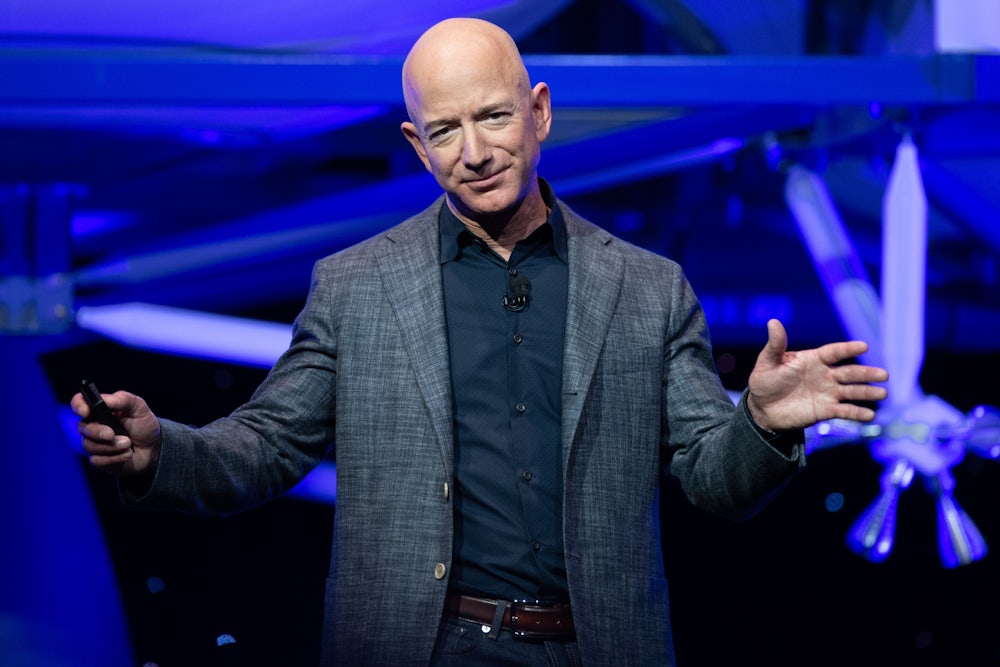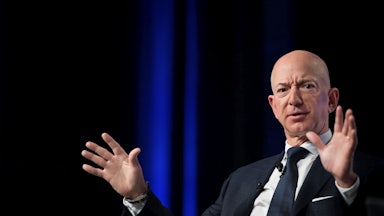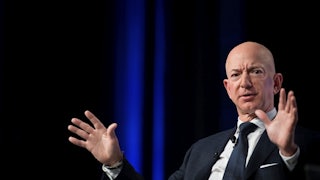We may one day recall the summer of 2021 as defined by proliferating climate catastrophes, the Afghan war withdrawal, a desperate effort to vaccinate the public against Covid-19, and a rudderless federal government overseeing it all. But for a special class of the ultrarich, and the tech geeks who worship them, this will be the summer of the billionaire space race, as we witness who can burn through more money and public attention in the effort to escape the bonds of Earth’s gravity for, well, a few minutes.
An unofficial competition between three masters of the universe—Jeff Bezos, Richard Branson, and Elon Musk (with Musk expressing less interest in personally going to space)—the starter’s gun will be fired this Sunday, when Branson takes off on a Virgin Galactic aircraft for his brief journey into the heavens. “I’ve always been a dreamer,” wrote Branson on Twitter. “My mum taught me to never give up and to reach for the stars.” If all goes well—and a morbid but relevant question here is the safety of these ventures—Branson will return to Earth having cemented his claim to ... what exactly? Spending money he’s earned off the labor of low-wage workers and shuffled between offshore tax havens, he will be the winner in an extravagant pageant that’s designed less to inaugurate a new era of spaceflight than to drum up business for his other companies. Branson, like his would-be spacefaring competitors, isn’t an innovator; he’s a salesman.
These men will not be the first billionaire in space—that honor goes to former Microsoft software engineer Charles Simonyi, who traveled on the Russian Soyuz spacecraft to the International Space Station for two weeks in 2007 and again in 2009—but simply be the first of the brash new trio of space innovators to fly into suborbital space and come back safely. (Branson’s flight plans to go 50 miles up, while Bezos will travel beyond the Karman Line, which is 62 miles above sea level.)
With references to childhoods weaned on the original space race—“Ever since I was five years old, I’ve dreamed of traveling to space,” Bezos said on Instagram this week—the troika of new space cadets will have you believe that they are fulfilling a collective goal of the human race, taking us one step closer toward a Star Trek–like future of boldly conceived space travel and exploration. Branson, for instance, has said he wants to make space travel “more accessible to all.” (Early reservations on Virgin Galactic flights cost $250,000 while a seat on the July 20 flight of Bezos’s Blue Origin sold for $28 million.) But any honest assessment of the billionaire space race shows that it’s less the dawning of a new epoch of universal space travel than the world’s most expensive infomercial for a network of self-dealing billionaires who plan to make a lot more money down here on terra firma. The three men’s business portfolios are not identical, nor are their stated priorities. (Bezos, for instance, claims to be most concerned about moving Earth’s industrial capacity off-world.) But they all retain potentially lucrative interests in satellite launch and rocketry firms, which is where the real money is. And should the launches go well, they all stand to benefit from rising optimism and investment in their industry.
While shuttling tourists into space for a few minutes of weightlessness may have its appeal, it’s a fleeting luxury only affordable by an elite class. Even so, companies like Virgin Galactic would have you think that this only slightly dystopian future is just around the corner. Branson has dubbed himself Astronaut 001, whose job is “evaluating customer spaceflight experience.” Branson may be keen to improve the experience for some of his friends who plop down for the next ride, but what he is really selling is the Virgin name and an image of innovation and safety that will help his group of companies pick off a satellite launch contract or two that might have gone to SpaceX. Branson’s trip into space isn’t being done for “us,” as a people that may one day sail among the stars; it’s for himself, Virgin Galactic, and the further commercialization of low-earth orbit.
We have been failed by our science fiction–inspired visions of seamless space travel, where the cancer-inducing, bone-rotting effects of cosmic radiation and low gravity have already been dealt with, and life on Earth is a peaceful agora, harmoniously supporting regular space travel. (This, of course, is a generalization of the kind of utopian space fiction that animated these men’s childhood fantasies.) We have clearly not solved our issues here on Earth, and the truth is that space is far worse: a grim void incredibly inhospitable to human life, requiring thousands of ground support employees who spend hours planning everything from how astronauts poop to choreographing dangerous spacewalks. Because of the enormous potential outlay of resources, the Branson and Bezos flights will likely be only a few minutes long. It may also cut down on the chances for something to go sideways. Humanity is no more ready for a sustained commercial presence in space than we are to live on the seafloor. It will be generations, if ever, before we have a colony on the moon—apologies to Newt Gingrich and his fellow lunar dreamers—and whoever eventually makes it to Mars will be lucky to survive the trip, much less return home (common hazards include crash landings and going insane on the long journey). These are profound civilizational challenges, perhaps even unnecessary ones, compared to the more urgent terrestrial issues of climate change, inequality, lack of health care, and insufficient housing.
That leads us to the basic dissonance at the heart of this new space race, the vast gap between the lives of its leaders and the rest of us, condemned to be earthly spectators. (The launches will be streamed live across various media.) With the Cold War–era space race, however flawed and militarized, at least it represented a collective effort, ostensibly divorced from the profit motive or egos of private citizens. Normal people went to space, not billionaires treating the cosmos as their personal plaything. The space race existed to marshal a sense of shared purpose (and, well, to make better ICBMs and spy satellites). It was subsumed by jingoism and nationalism, yes, but it gestured toward higher values that are nowhere to be found in a glitzy Virgin Galactic production.
The best argument against the billionaire space race is how little impact it will have on the lives of most of Earth’s inhabitants. It will inaugurate a new era of ultra-expensive stunt tourism, perhaps, but it will do nothing for the common good, especially when companies like SpaceX and Blue Origin are competing to crowd low-earth orbit with thousands of small satellites. Vast and unearned fortunes have been spent on what are essentially private entertainments: Bezos has said that he sells $1 billion in Amazon stock each year to fund Blue Origin. It’s also no coincidence that the planet’s two richest men are pursuing these efforts after seeing their fortunes rise by tens of billions during the pandemic. They simply have too much money. At a time when our earthly inequities could not be more clear, it is obscene to allow moguls to pour their untaxed billions, earned on the backs of precarious workers, into private ventures divorced from everyday concern or accountability. If Branson’s brief trip to suborbital space is a success, a few investors, and even some industry rivals, may be pleased, but the principal benefits will flow to one person: Richard Branson.








